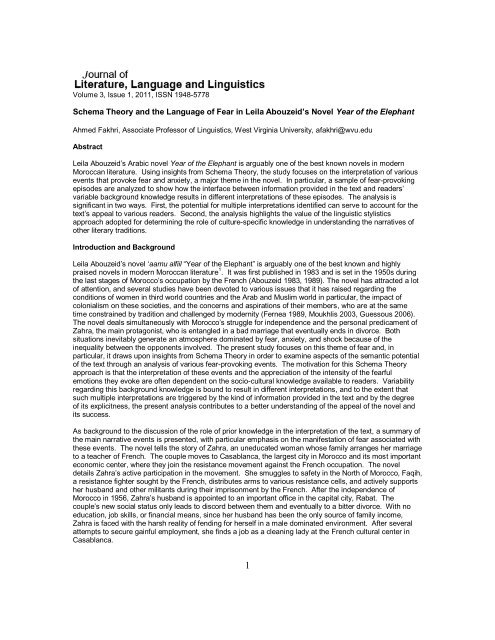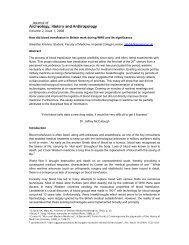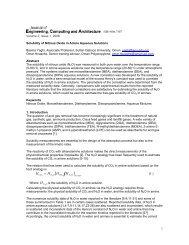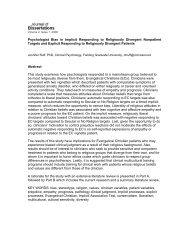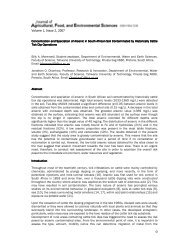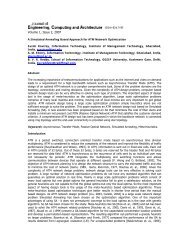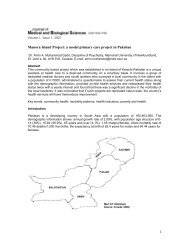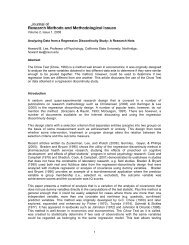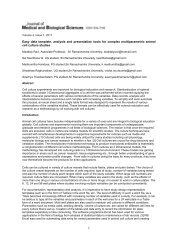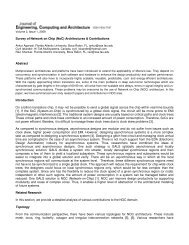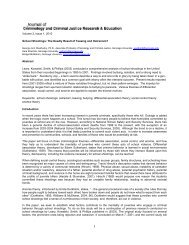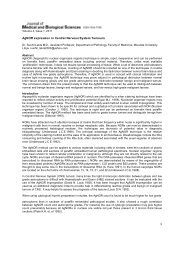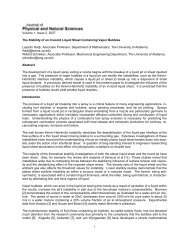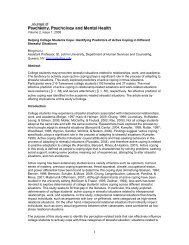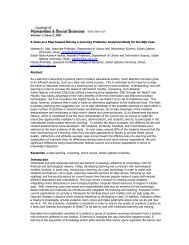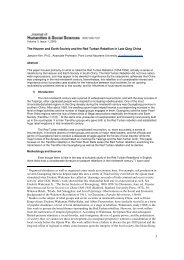Schema Theory and the Language of Fear in Leila Abouzeid's Novel ...
Schema Theory and the Language of Fear in Leila Abouzeid's Novel ...
Schema Theory and the Language of Fear in Leila Abouzeid's Novel ...
You also want an ePaper? Increase the reach of your titles
YUMPU automatically turns print PDFs into web optimized ePapers that Google loves.
Volume 3, Issue 1, 2011, ISSN 1948-5778<br />
<strong>Schema</strong> <strong>Theory</strong> <strong>and</strong> <strong>the</strong> <strong>Language</strong> <strong>of</strong> <strong>Fear</strong> <strong>in</strong> <strong>Leila</strong> Abouzeid’s <strong>Novel</strong> Year <strong>of</strong> <strong>the</strong> Elephant<br />
Ahmed Fakhri, Associate Pr<strong>of</strong>essor <strong>of</strong> L<strong>in</strong>guistics, West Virg<strong>in</strong>ia University, afakhri@wvu.edu<br />
Abstract<br />
<strong>Leila</strong> Abouzeid‟s Arabic novel Year <strong>of</strong> <strong>the</strong> Elephant is arguably one <strong>of</strong> <strong>the</strong> best known novels <strong>in</strong> modern<br />
Moroccan literature. Us<strong>in</strong>g <strong>in</strong>sights from <strong>Schema</strong> <strong>Theory</strong>, <strong>the</strong> study focuses on <strong>the</strong> <strong>in</strong>terpretation <strong>of</strong> various<br />
events that provoke fear <strong>and</strong> anxiety, a major <strong>the</strong>me <strong>in</strong> <strong>the</strong> novel. In particular, a sample <strong>of</strong> fear-provok<strong>in</strong>g<br />
episodes are analyzed to show how <strong>the</strong> <strong>in</strong>terface between <strong>in</strong>formation provided <strong>in</strong> <strong>the</strong> text <strong>and</strong> readers‟<br />
variable background knowledge results <strong>in</strong> different <strong>in</strong>terpretations <strong>of</strong> <strong>the</strong>se episodes. The analysis is<br />
significant <strong>in</strong> two ways. First, <strong>the</strong> potential for multiple <strong>in</strong>terpretations identified can serve to account for <strong>the</strong><br />
text‟s appeal to various readers. Second, <strong>the</strong> analysis highlights <strong>the</strong> value <strong>of</strong> <strong>the</strong> l<strong>in</strong>guistic stylistics<br />
approach adopted for determ<strong>in</strong><strong>in</strong>g <strong>the</strong> role <strong>of</strong> culture-specific knowledge <strong>in</strong> underst<strong>and</strong><strong>in</strong>g <strong>the</strong> narratives <strong>of</strong><br />
o<strong>the</strong>r literary traditions.<br />
Introduction <strong>and</strong> Background<br />
<strong>Leila</strong> Abouzeid‟s novel „aamu alfiil “Year <strong>of</strong> <strong>the</strong> Elephant” is arguably one <strong>of</strong> <strong>the</strong> best known <strong>and</strong> highly<br />
praised novels <strong>in</strong> modern Moroccan literature 1 . It was first published <strong>in</strong> 1983 <strong>and</strong> is set <strong>in</strong> <strong>the</strong> 1950s dur<strong>in</strong>g<br />
<strong>the</strong> last stages <strong>of</strong> Morocco‟s occupation by <strong>the</strong> French (Abouzeid 1983, 1989). The novel has attracted a lot<br />
<strong>of</strong> attention, <strong>and</strong> several studies have been devoted to various issues that it has raised regard<strong>in</strong>g <strong>the</strong><br />
conditions <strong>of</strong> women <strong>in</strong> third world countries <strong>and</strong> <strong>the</strong> Arab <strong>and</strong> Muslim world <strong>in</strong> particular, <strong>the</strong> impact <strong>of</strong><br />
colonialism on <strong>the</strong>se societies, <strong>and</strong> <strong>the</strong> concerns <strong>and</strong> aspirations <strong>of</strong> <strong>the</strong>ir members, who are at <strong>the</strong> same<br />
time constra<strong>in</strong>ed by tradition <strong>and</strong> challenged by modernity (Fernea 1989, Moukhlis 2003, Guessous 2006).<br />
The novel deals simultaneously with Morocco‟s struggle for <strong>in</strong>dependence <strong>and</strong> <strong>the</strong> personal predicament <strong>of</strong><br />
Zahra, <strong>the</strong> ma<strong>in</strong> protagonist, who is entangled <strong>in</strong> a bad marriage that eventually ends <strong>in</strong> divorce. Both<br />
situations <strong>in</strong>evitably generate an atmosphere dom<strong>in</strong>ated by fear, anxiety, <strong>and</strong> shock because <strong>of</strong> <strong>the</strong><br />
<strong>in</strong>equality between <strong>the</strong> opponents <strong>in</strong>volved. The present study focuses on this <strong>the</strong>me <strong>of</strong> fear <strong>and</strong>, <strong>in</strong><br />
particular, it draws upon <strong>in</strong>sights from <strong>Schema</strong> <strong>Theory</strong> <strong>in</strong> order to exam<strong>in</strong>e aspects <strong>of</strong> <strong>the</strong> semantic potential<br />
<strong>of</strong> <strong>the</strong> text through an analysis <strong>of</strong> various fear-provok<strong>in</strong>g events. The motivation for this <strong>Schema</strong> <strong>Theory</strong><br />
approach is that <strong>the</strong> <strong>in</strong>terpretation <strong>of</strong> <strong>the</strong>se events <strong>and</strong> <strong>the</strong> appreciation <strong>of</strong> <strong>the</strong> <strong>in</strong>tensity <strong>of</strong> <strong>the</strong> fearful<br />
emotions <strong>the</strong>y evoke are <strong>of</strong>ten dependent on <strong>the</strong> socio-cultural knowledge available to readers. Variability<br />
regard<strong>in</strong>g this background knowledge is bound to result <strong>in</strong> different <strong>in</strong>terpretations, <strong>and</strong> to <strong>the</strong> extent that<br />
such multiple <strong>in</strong>terpretations are triggered by <strong>the</strong> k<strong>in</strong>d <strong>of</strong> <strong>in</strong>formation provided <strong>in</strong> <strong>the</strong> text <strong>and</strong> by <strong>the</strong> degree<br />
<strong>of</strong> its explicitness, <strong>the</strong> present analysis contributes to a better underst<strong>and</strong><strong>in</strong>g <strong>of</strong> <strong>the</strong> appeal <strong>of</strong> <strong>the</strong> novel <strong>and</strong><br />
its success.<br />
As background to <strong>the</strong> discussion <strong>of</strong> <strong>the</strong> role <strong>of</strong> prior knowledge <strong>in</strong> <strong>the</strong> <strong>in</strong>terpretation <strong>of</strong> <strong>the</strong> text, a summary <strong>of</strong><br />
<strong>the</strong> ma<strong>in</strong> narrative events is presented, with particular emphasis on <strong>the</strong> manifestation <strong>of</strong> fear associated with<br />
<strong>the</strong>se events. The novel tells <strong>the</strong> story <strong>of</strong> Zahra, an uneducated woman whose family arranges her marriage<br />
to a teacher <strong>of</strong> French. The couple moves to Casablanca, <strong>the</strong> largest city <strong>in</strong> Morocco <strong>and</strong> its most important<br />
economic center, where <strong>the</strong>y jo<strong>in</strong> <strong>the</strong> resistance movement aga<strong>in</strong>st <strong>the</strong> French occupation. The novel<br />
details Zahra‟s active participation <strong>in</strong> <strong>the</strong> movement. She smuggles to safety <strong>in</strong> <strong>the</strong> North <strong>of</strong> Morocco, Faqih,<br />
a resistance fighter sought by <strong>the</strong> French, distributes arms to various resistance cells, <strong>and</strong> actively supports<br />
her husb<strong>and</strong> <strong>and</strong> o<strong>the</strong>r militants dur<strong>in</strong>g <strong>the</strong>ir imprisonment by <strong>the</strong> French. After <strong>the</strong> <strong>in</strong>dependence <strong>of</strong><br />
Morocco <strong>in</strong> 1956, Zahra‟s husb<strong>and</strong> is appo<strong>in</strong>ted to an important <strong>of</strong>fice <strong>in</strong> <strong>the</strong> capital city, Rabat. The<br />
couple‟s new social status only leads to discord between <strong>the</strong>m <strong>and</strong> eventually to a bitter divorce. With no<br />
education, job skills, or f<strong>in</strong>ancial means, s<strong>in</strong>ce her husb<strong>and</strong> has been <strong>the</strong> only source <strong>of</strong> family <strong>in</strong>come,<br />
Zahra is faced with <strong>the</strong> harsh reality <strong>of</strong> fend<strong>in</strong>g for herself <strong>in</strong> a male dom<strong>in</strong>ated environment. After several<br />
attempts to secure ga<strong>in</strong>ful employment, she f<strong>in</strong>ds a job as a clean<strong>in</strong>g lady at <strong>the</strong> French cultural center <strong>in</strong><br />
Casablanca.<br />
1
It should be noted, however, that this chronology <strong>of</strong> events is not followed <strong>in</strong> <strong>the</strong> novel. Instead, <strong>the</strong> author<br />
skillfully <strong>in</strong>terweaves <strong>the</strong> events relat<strong>in</strong>g Morocco‟s struggle for <strong>in</strong>dependence <strong>and</strong> Zahra‟s personal quarrel<br />
with an abusive husb<strong>and</strong> empowered by a social order that is very detrimental to women. On numerous<br />
occasions, <strong>the</strong> author explicitly draws parallels <strong>and</strong> establishes l<strong>in</strong>ks between <strong>the</strong> public resistance aga<strong>in</strong>st<br />
<strong>the</strong> colonizers <strong>and</strong> Zahra‟s private marital predicament. For example, when her husb<strong>and</strong> boasts that he has<br />
helped to get rid <strong>of</strong> <strong>the</strong> French, Zahra cannot resist <strong>the</strong> thought that now it is her turn: he is plann<strong>in</strong>g to get<br />
rid <strong>of</strong> her. Perhaps more relevant to <strong>the</strong> topic <strong>of</strong> <strong>the</strong> present study are <strong>in</strong>stances where shock <strong>and</strong> fear<br />
provide <strong>the</strong> l<strong>in</strong>kage between <strong>the</strong> two situations. For example, when recall<strong>in</strong>g how she learnt that <strong>the</strong> French<br />
had caught her husb<strong>and</strong> <strong>and</strong> sent him to prison, Zahra had <strong>the</strong> follow<strong>in</strong>g thought (see <strong>the</strong> chart below for <strong>the</strong><br />
phonetic value <strong>of</strong> <strong>the</strong> transcription symbols used <strong>and</strong> footnote 2 for <strong>in</strong>formation about <strong>the</strong> translation):<br />
Hasibtuhaa ‟ahwala laHDha Hattaa jalasa ‟amaamii fii dhaalika alyawmi wa qaala wa lam yaTrif<br />
lahu jafn:<br />
“sataSiluki waraqatuk ma„a maa yuxawwiluhu alqaanuun.”<br />
I thought that was <strong>the</strong> most dreadful moment [<strong>the</strong> capture <strong>of</strong> her husb<strong>and</strong>] until that day when he<br />
sat <strong>in</strong> front <strong>of</strong> me <strong>and</strong> said without a bl<strong>in</strong>k: “You will get your paper <strong>and</strong> whatever <strong>the</strong> law provides.”<br />
(p. 53) 2<br />
The paper <strong>in</strong> question is <strong>the</strong> divorce notification. Besides such explicit l<strong>in</strong>kage by <strong>the</strong> author, it is not hard to<br />
detect similarities between <strong>the</strong> two conflicts regard<strong>in</strong>g <strong>the</strong> tendency <strong>of</strong> both to generate shock <strong>and</strong> fear.<br />
Typically fear is triggered by violent encounters with <strong>the</strong> enemy. Perhaps <strong>the</strong> most tragic <strong>and</strong> dreadful<br />
encounter occurs when Zahra witnesses <strong>in</strong> <strong>the</strong> streets <strong>of</strong> Casablanca <strong>the</strong> slaughter <strong>of</strong> <strong>in</strong>nocent <strong>and</strong><br />
defenseless women <strong>and</strong> children by mach<strong>in</strong>egun-tot<strong>in</strong>g soldiers from <strong>the</strong> French Foreign Legion. That day<br />
is described as yawmun ’aswad “a black day” <strong>and</strong> yamun rahiib “a horrific day.” <strong>Fear</strong> <strong>and</strong> violence are also<br />
present <strong>in</strong> <strong>the</strong> quarrels between Zahra <strong>and</strong> her husb<strong>and</strong>. When she confronts him with <strong>the</strong> fact that he has<br />
been cheat<strong>in</strong>g on her with his secretary, he simply turns around <strong>and</strong> slaps her (p. 71). This <strong>in</strong>cident echoes<br />
a previous one dur<strong>in</strong>g which a French soldier slaps a woman while <strong>in</strong>terrogat<strong>in</strong>g her about <strong>the</strong> whereabouts<br />
<strong>of</strong> her fugitive husb<strong>and</strong> (p. 37).<br />
Such fear-provok<strong>in</strong>g situations, whe<strong>the</strong>r related to <strong>the</strong> bad marriage or <strong>the</strong> foreign occupation, have similar<br />
effects on <strong>the</strong> victim: typically <strong>the</strong>y provoke numbness, contortion, nauseous feel<strong>in</strong>gs, <strong>and</strong> loss <strong>of</strong><br />
awareness. After witness<strong>in</strong>g <strong>the</strong> kill<strong>in</strong>g <strong>of</strong> women <strong>and</strong> children <strong>in</strong> Casablanca, Zahra experiences a<br />
frighten<strong>in</strong>g loss <strong>of</strong> awareness <strong>and</strong> walks away “as if she were asleep.” She has similar feel<strong>in</strong>gs just th<strong>in</strong>k<strong>in</strong>g<br />
about how awful her repudiation has been: when she gets her divorce notification at <strong>the</strong> post <strong>of</strong>fice, she<br />
leaves <strong>the</strong> build<strong>in</strong>g <strong>and</strong> aimlessly w<strong>and</strong>ers around until she f<strong>in</strong>ds a bench <strong>and</strong> sits down to rest. Only <strong>the</strong>n<br />
does she realize where she is. These various aspects <strong>of</strong> <strong>the</strong> symmetry between <strong>the</strong> public <strong>and</strong> <strong>the</strong> private<br />
struggles enhance <strong>the</strong> coherence <strong>of</strong> <strong>the</strong> narrative <strong>and</strong> account <strong>in</strong> part for its appeal. This brief discussion <strong>of</strong><br />
<strong>the</strong> manifestation <strong>of</strong> shock <strong>and</strong> fear <strong>in</strong> <strong>the</strong> novel will suffice as a background for <strong>the</strong> specific purpose <strong>of</strong> <strong>the</strong><br />
study, namely, <strong>the</strong> consideration <strong>of</strong> <strong>the</strong> expression <strong>of</strong> fear from a <strong>Schema</strong> <strong>Theory</strong> perspective.<br />
Phonetic Value <strong>of</strong> Symbols Used <strong>in</strong> <strong>the</strong> Arabic Transcription<br />
________________________________________________________________<br />
dh <strong>in</strong>terdental voiced fricative<br />
th <strong>in</strong>terdental voiceless fricative<br />
D voiced pharyngealized dental stop (emphatic equivalent <strong>of</strong> [d])<br />
Dh voiced pharyngealized <strong>in</strong>terdental fricative (emphatic equivalent <strong>of</strong> dh)<br />
T voiceless pharyngealized dental stop (emphatic equivalent <strong>of</strong> [t])<br />
S voiceless pharyngealized alveolar fricative (emphatic equivalent <strong>of</strong> [s])<br />
H voiceless pharyngeal fricative<br />
gh voiced uvular fricative<br />
q voiceless uvular stop<br />
x voiceless uvular fricative<br />
‟ glottal stop<br />
„ voiced pharyngeal fricative<br />
_________________________________________________________________<br />
2
<strong>Schema</strong> <strong>Theory</strong> <strong>and</strong> <strong>the</strong> Interpretation <strong>of</strong> <strong>Fear</strong>-Provok<strong>in</strong>g Scenes<br />
The application <strong>of</strong> schema <strong>the</strong>ory <strong>in</strong> <strong>the</strong> present analysis aims at show<strong>in</strong>g how readers‟ awareness <strong>of</strong><br />
culturally specific knowledge (or <strong>the</strong> lack <strong>the</strong>re<strong>of</strong>) may affect <strong>the</strong>ir <strong>in</strong>terpretation <strong>of</strong> <strong>in</strong>formation, events, or<br />
behaviors described <strong>in</strong> <strong>the</strong> text. This application is carried out <strong>in</strong> two steps. First, <strong>the</strong> relationship between<br />
prior knowledge <strong>and</strong> <strong>the</strong> <strong>in</strong>terpretation <strong>of</strong> fear-provok<strong>in</strong>g scenes is illustrated through examples <strong>of</strong><br />
confrontations between Zahra <strong>and</strong> her husb<strong>and</strong> <strong>and</strong> between <strong>the</strong> French occupiers <strong>and</strong> <strong>the</strong> Moroccan<br />
population. Second, it is shown how expectations based on particular prior knowledge may need to be<br />
adjusted <strong>in</strong> order to accommodate new <strong>in</strong>formation provided <strong>in</strong> <strong>the</strong> text <strong>and</strong> to achieve a coherent<br />
underst<strong>and</strong><strong>in</strong>g <strong>of</strong> <strong>the</strong> outcomes <strong>of</strong> <strong>the</strong> narrative. These two issues are elaborated upon after a brief<br />
presentation <strong>of</strong> relevant aspects <strong>of</strong> <strong>Schema</strong> <strong>Theory</strong>.<br />
<strong>Schema</strong> <strong>Theory</strong> posits that <strong>the</strong> <strong>in</strong>terpretation <strong>of</strong> texts <strong>in</strong>volves both process<strong>in</strong>g what is explicitly presented <strong>in</strong><br />
<strong>the</strong> text itself <strong>and</strong> mak<strong>in</strong>g <strong>in</strong>tricate <strong>in</strong>ferences based on previously acquired knowledge (Brown <strong>and</strong> Yule<br />
1984, M<strong>and</strong>ler 1984). This body <strong>of</strong> prior knowledge consists <strong>of</strong> schemata, scripts, or frames which<br />
represent typical concepts, entities, events, <strong>and</strong> everyday rout<strong>in</strong>es shared by members <strong>of</strong> <strong>the</strong> same sociocultural<br />
community. Once activated by <strong>in</strong>put from <strong>the</strong> text, <strong>the</strong>se scripts are used to organize <strong>in</strong>com<strong>in</strong>g<br />
<strong>in</strong>formation <strong>in</strong> a coherent fashion <strong>in</strong> order to make sense out <strong>of</strong> it. Typical examples <strong>of</strong> scripts <strong>of</strong>ten cited <strong>in</strong><br />
<strong>the</strong> <strong>Schema</strong> <strong>Theory</strong> literature are <strong>the</strong> birthday party script <strong>and</strong> <strong>the</strong> restaurant script (Thorndyke <strong>and</strong> Yekovich<br />
1980, M<strong>and</strong>ler 1984). Consider <strong>the</strong> follow<strong>in</strong>g example adopted from Thorndyke <strong>and</strong> Yekovich (1980:28):<br />
John‟s birthday party was a success. He liked both <strong>the</strong> cake <strong>and</strong> <strong>the</strong> new<br />
sweater.<br />
The mention <strong>of</strong> <strong>the</strong> term “birthday party” <strong>in</strong> <strong>the</strong> first sentence activates readers‟ knowledge <strong>of</strong> birthday parties<br />
<strong>in</strong> general, which enables <strong>the</strong>m to fill <strong>in</strong> <strong>in</strong>formation gaps <strong>in</strong> <strong>the</strong> text <strong>and</strong> <strong>in</strong>terpret <strong>the</strong> term “cake” as be<strong>in</strong>g<br />
<strong>the</strong> birthday cake <strong>and</strong> “new sweater” as be<strong>in</strong>g a present given to John, s<strong>in</strong>ce normally birthday parties<br />
<strong>in</strong>clude such events as giv<strong>in</strong>g presents <strong>and</strong> eat<strong>in</strong>g cake.<br />
The present study is not concerned with <strong>the</strong> m<strong>in</strong>ute details <strong>of</strong> schema <strong>the</strong>ory or its various<br />
conceptualizations <strong>and</strong> <strong>the</strong>ir relative merits (see M<strong>and</strong>ler 1984 for a concise <strong>and</strong> accessible discussion <strong>of</strong><br />
<strong>the</strong>se issues). Follow<strong>in</strong>g <strong>the</strong> example <strong>of</strong> previous studies such as Freundlieb (1982), which used <strong>Schema</strong><br />
<strong>Theory</strong> to propose different read<strong>in</strong>gs <strong>of</strong> some <strong>of</strong> Edgar Allan Poe‟s tales, an <strong>in</strong>formal application <strong>of</strong> selected<br />
aspects <strong>of</strong> <strong>Schema</strong> <strong>Theory</strong> is deemed sufficient for ga<strong>in</strong><strong>in</strong>g <strong>in</strong>sights <strong>in</strong>to <strong>the</strong> topic at h<strong>and</strong>, namely <strong>the</strong> role <strong>of</strong><br />
prior knowledge <strong>in</strong> <strong>the</strong> <strong>in</strong>terpretation <strong>of</strong> passages evok<strong>in</strong>g fear. Aspects <strong>of</strong> <strong>Schema</strong> <strong>Theory</strong> which are<br />
relevant for <strong>the</strong> present analysis <strong>in</strong>clude <strong>the</strong> follow<strong>in</strong>g. First, scripts conta<strong>in</strong> structured <strong>in</strong>formation about<br />
typical situations that is temporally or hierarchically organized. Thus <strong>the</strong> script <strong>of</strong> eat<strong>in</strong>g <strong>in</strong> a restaurant<br />
<strong>in</strong>cludes a particular sequence <strong>of</strong> events such as enter<strong>in</strong>g a restaurant, be<strong>in</strong>g seated, <strong>and</strong> order<strong>in</strong>g food.<br />
Each event subsumes lower level details. For example, order<strong>in</strong>g food is a ma<strong>in</strong> event consist<strong>in</strong>g <strong>of</strong> <strong>the</strong><br />
follow<strong>in</strong>g sub-events: read<strong>in</strong>g <strong>the</strong> menu, <strong>in</strong>quir<strong>in</strong>g about particular food items, <strong>and</strong> mak<strong>in</strong>g a selection (den<br />
Uyl <strong>and</strong> van Oostendorp 1980). Second, <strong>in</strong> <strong>the</strong> process <strong>of</strong> <strong>in</strong>terpret<strong>in</strong>g a text, expectations entailed by a<br />
particular script may be contradicted by new <strong>in</strong>formation which forces <strong>the</strong> reader to resort to o<strong>the</strong>r scripts<br />
<strong>and</strong> make necessary adjustments <strong>in</strong> order to resolve <strong>the</strong> contradictions (Spiro 1980). Third, writers‟<br />
awareness <strong>of</strong> <strong>the</strong> presence or absence <strong>of</strong> particular schemata <strong>in</strong> readers‟ background knowledge<br />
determ<strong>in</strong>es <strong>the</strong> k<strong>in</strong>d <strong>and</strong> amount <strong>of</strong> <strong>in</strong>formation <strong>the</strong>y provide (Spiro 1980). These three aspects will be<br />
recalled as needed <strong>in</strong> <strong>the</strong> follow<strong>in</strong>g discussion <strong>of</strong> prior knowledge <strong>and</strong> <strong>the</strong> <strong>in</strong>terpretation <strong>of</strong> <strong>the</strong> text.<br />
The use <strong>of</strong> prior knowledge for underst<strong>and</strong><strong>in</strong>g fear-provok<strong>in</strong>g situations <strong>and</strong> <strong>the</strong> character behavior <strong>the</strong>y<br />
entail can be illustrated through passages depict<strong>in</strong>g encounters between <strong>the</strong> occupation army <strong>and</strong> <strong>the</strong> local<br />
population on <strong>the</strong> one h<strong>and</strong>, <strong>and</strong> between Zahra <strong>and</strong> her husb<strong>and</strong>, on <strong>the</strong> o<strong>the</strong>r. In one <strong>of</strong> <strong>the</strong> most dramatic<br />
scenes <strong>in</strong> <strong>the</strong> novel, a group <strong>of</strong> soldiers descend on Zahra‟s neighborhood, look<strong>in</strong>g for a member <strong>of</strong> <strong>the</strong><br />
resistance movement. The soldiers br<strong>in</strong>g out a woman <strong>and</strong> proceed to <strong>in</strong>terrogate her about <strong>the</strong><br />
whereabouts <strong>of</strong> <strong>the</strong> wanted man. This scene is witnessed from beh<strong>in</strong>d closed doors by Zahra, her husb<strong>and</strong>,<br />
<strong>and</strong> Faqih, ano<strong>the</strong>r militant. Initially <strong>the</strong> woman denies any knowledge <strong>of</strong> where her husb<strong>and</strong> is. The<br />
narration proceeds as follows:<br />
Safa„ahaa ‟aHaduhum wa qaala bi al„arabiyya wa huwa yanTiqu arraa„a ghaynan:<br />
---fi alma„aarif ta„rifi<strong>in</strong>.<br />
3
---yuujadu „<strong>in</strong>da ‟ibni „ammih.<br />
One <strong>of</strong> <strong>the</strong>m [<strong>the</strong> soldiers] slapped her <strong>and</strong> said <strong>in</strong> Arabic pronounc<strong>in</strong>g <strong>the</strong> “r” as a “ghayn,” [a<br />
uvular sound]:<br />
---In Maarif you will know.<br />
---He is at his cous<strong>in</strong>‟s. (p. 37)<br />
The woman‟s confession can be <strong>in</strong>terpreted differently depend<strong>in</strong>g on <strong>the</strong> prior knowledge available to <strong>the</strong><br />
reader. Accord<strong>in</strong>g to <strong>the</strong> explicit <strong>in</strong>formation provided <strong>in</strong> <strong>the</strong> text, <strong>the</strong> confession can be seen ma<strong>in</strong>ly as <strong>the</strong><br />
result <strong>of</strong> <strong>the</strong> violent treatment to which <strong>the</strong> woman has been subjected. However, <strong>the</strong> follow<strong>in</strong>g culturally<br />
specific knowledge will no doubt affect <strong>the</strong> <strong>in</strong>terpretation <strong>of</strong> this scene <strong>and</strong> <strong>the</strong> appreciation <strong>of</strong> <strong>the</strong> <strong>in</strong>tensity <strong>of</strong><br />
<strong>the</strong> fear it must have provoked <strong>in</strong> <strong>the</strong> woman. First, Maarif was a notorious police station <strong>in</strong> Casablanca,<br />
which over <strong>the</strong> years had been associated <strong>in</strong> <strong>the</strong> m<strong>in</strong>ds <strong>of</strong> <strong>the</strong> local population with <strong>the</strong> brutal treatment <strong>of</strong><br />
deta<strong>in</strong>ees. The script associated with Maarif <strong>in</strong>cludes anxiety, mistreatment, <strong>and</strong> humiliation, <strong>and</strong>,<br />
depend<strong>in</strong>g on readers‟ experiences, it may even <strong>in</strong>clude particular violent <strong>in</strong>cidents or unpleasant events<br />
that <strong>the</strong> mention <strong>of</strong> <strong>the</strong> term would conjure up. Second, <strong>the</strong> detail regard<strong>in</strong>g <strong>the</strong> pronunciation <strong>of</strong> <strong>the</strong> “r” <strong>in</strong> <strong>the</strong><br />
word “Maarif” is not fortuitous. It is quite significant because it signals <strong>the</strong> presence <strong>of</strong> <strong>the</strong> French enemy,<br />
betrayed by <strong>the</strong> Parisian pronunciation <strong>of</strong> <strong>the</strong> “r” as a voiced uvular fricative. In <strong>Schema</strong> <strong>Theory</strong> terms, <strong>the</strong><br />
author‟s subtle h<strong>in</strong>t that <strong>the</strong> speaker is French is motivated by her awareness that many readers, especially<br />
<strong>the</strong> Arabic-French bil<strong>in</strong>guals, possess, as part <strong>of</strong> <strong>the</strong>ir prior knowledge, <strong>the</strong> sociol<strong>in</strong>guistic <strong>in</strong>formation<br />
regard<strong>in</strong>g <strong>the</strong> French pronunciation <strong>of</strong> <strong>the</strong> “r”. The availability or non-availability to <strong>the</strong> readers <strong>of</strong> such prior<br />
knowledge will <strong>in</strong>fluence <strong>the</strong>ir assessment <strong>of</strong> <strong>the</strong> dangerousness <strong>of</strong> <strong>the</strong> situation <strong>and</strong> <strong>the</strong>ir underst<strong>and</strong><strong>in</strong>g <strong>of</strong><br />
<strong>the</strong> reaction <strong>of</strong> <strong>the</strong> participants. If <strong>the</strong> mentioned background details about <strong>the</strong> Maarif police station <strong>and</strong> <strong>the</strong><br />
French pronunciation <strong>of</strong> <strong>the</strong> “r” are available to <strong>the</strong> reader, <strong>the</strong> latter will conclude that <strong>the</strong> victim <strong>of</strong> <strong>the</strong><br />
encounter has not turned <strong>in</strong> her husb<strong>and</strong> simply because she is slapped; but also, <strong>and</strong> perhaps more<br />
importantly, because <strong>of</strong> <strong>the</strong> om<strong>in</strong>ous threat evoked by her potential dest<strong>in</strong>ation, Maarif, <strong>and</strong> by <strong>the</strong> identity <strong>of</strong><br />
<strong>the</strong> people she will have to deal with, <strong>the</strong> French occupiers. The way this <strong>in</strong>cident is <strong>in</strong>terpreted has fur<strong>the</strong>r<br />
implications for underst<strong>and</strong><strong>in</strong>g subsequent events. When Faqih asks Zahra‟s husb<strong>and</strong> for help because he<br />
no longer has <strong>the</strong> strength to pursue his activities as a resistance fighter, <strong>the</strong> husb<strong>and</strong> exploits <strong>the</strong> <strong>in</strong>cident<br />
just witnessed <strong>and</strong> quite dis<strong>in</strong>genuously highlights <strong>the</strong> importance <strong>of</strong> <strong>the</strong> slap <strong>in</strong> <strong>the</strong> woman‟s confession at<br />
<strong>the</strong> detriment <strong>of</strong> <strong>the</strong> o<strong>the</strong>r factors mentioned. His <strong>in</strong>tention is to demean Faqih <strong>and</strong> portray him as lack<strong>in</strong>g<br />
courage; he says to him:<br />
---tusallimu nafsak? hih? ‟alam tara? biSaf„at<strong>in</strong> ‟a„Tat zawjahaa.<br />
You are go<strong>in</strong>g to turn yourself <strong>in</strong>, aren‟t you? Did you see that? A simple slap,<br />
<strong>and</strong> she turns <strong>in</strong> her husb<strong>and</strong>. (p. 37)<br />
In fact readers would be more sympa<strong>the</strong>tic toward Faqih‟s plight if <strong>the</strong>y realize that <strong>in</strong> case he is<br />
apprehended, <strong>the</strong> retribution will be more severe than a mere slap: he might end up <strong>in</strong> <strong>the</strong> notorious Maarif<br />
police station <strong>and</strong> endure mistreatment by <strong>the</strong> French enemy. Indeed he admits that he will confess “under<br />
<strong>the</strong> whip.”<br />
Concern<strong>in</strong>g <strong>the</strong> private strife between Zahra <strong>and</strong> her husb<strong>and</strong>, one <strong>of</strong> <strong>the</strong> most poignant encounters occurs<br />
when <strong>the</strong> latter abruptly tells her that he has repudiated her <strong>and</strong> that her divorce papers will be sent to her.<br />
jalasa wa qaal: “sataSiluki waraqatuk ma„a maa yuxawwiluhu alqaanuun.”<br />
---limaadhaa?”<br />
---laysa „<strong>in</strong>dii ‟ayyu sabab.<br />
He sat down <strong>and</strong> said: “your paper will get to you with whatever <strong>the</strong> law<br />
provides.”<br />
---Why?<br />
---I don‟t have any reason. (p. 9)<br />
The impact on Zahra <strong>of</strong> <strong>the</strong> utterance sataSiluki warqatuk… “your paper will get to you…” repeated several<br />
times throughout <strong>the</strong> novel, is devastat<strong>in</strong>g, as she herself describes:<br />
4
‟<strong>in</strong> kuntu qad ghibtu fa ‟anaa laa ‟adrii wa laak<strong>in</strong>ni ‟a„lamu ‟annanii wajadtunii muqawwasa wa ra‟sii<br />
maa‟ilatun ‟ilaa alyasaar wa yadaaya mabsuuTataani ka‟annanii juththa.<br />
I don‟t know whe<strong>the</strong>r I fa<strong>in</strong>ted; but I know that I found myself arched with my head tilted to <strong>the</strong> left<br />
<strong>and</strong> my h<strong>and</strong>s stretched out as if I were a corpse.” (p. 9)<br />
In order to underst<strong>and</strong> fully why this simple utterance is so devastat<strong>in</strong>g <strong>and</strong> appreciate <strong>the</strong> shock it has<br />
brought about, it is helpful to characterize <strong>the</strong> divorce script available to members <strong>of</strong> <strong>the</strong> Moroccan<br />
community at <strong>the</strong> time period considered 3 . A plausible script for divorce <strong>in</strong> western societies may <strong>in</strong>clude a<br />
sequence <strong>of</strong> events such as fil<strong>in</strong>g for divorce, attempts at reconciliation, appearance by <strong>the</strong> parties before a<br />
family court judge, <strong>and</strong> f<strong>in</strong>ally <strong>the</strong> court‟s decision <strong>and</strong> notification <strong>of</strong> <strong>the</strong> parties (see above discussion <strong>of</strong><br />
<strong>Schema</strong> <strong>Theory</strong>). In <strong>the</strong> Moroccan context, however, <strong>the</strong> divorce script does not <strong>in</strong>clude a similarly<br />
elaborate procedure: <strong>the</strong> husb<strong>and</strong> has <strong>the</strong> right simply to <strong>in</strong>form <strong>the</strong> court <strong>of</strong> his desire to repudiate his wife,<br />
<strong>and</strong> <strong>the</strong> court sends a repudiation letter to <strong>the</strong> wife. Awareness <strong>of</strong> such an abrupt, unfair, <strong>and</strong> f<strong>in</strong>al<br />
procedure is necessary to appreciate <strong>the</strong> impact <strong>of</strong> divorce on Moroccan women. For Zahra <strong>the</strong> shock<br />
created by her repudiation is so overwhelm<strong>in</strong>g that even quite some time later when <strong>the</strong> repudiation papers<br />
arrive, she f<strong>in</strong>ds herself aga<strong>in</strong> <strong>in</strong> <strong>the</strong> grip <strong>of</strong> <strong>in</strong>tense fear, which compels her to seek comfort <strong>in</strong> <strong>the</strong> shr<strong>in</strong>e <strong>of</strong><br />
an old religious man <strong>in</strong> her native town. There, her fear <strong>and</strong> anxiety are somewhat eased by verses <strong>of</strong> <strong>the</strong><br />
Quran be<strong>in</strong>g recited <strong>and</strong> by <strong>the</strong> holy man‟s sooth<strong>in</strong>g calmness <strong>and</strong> wisdom:<br />
qaala fii huduu‟hi wa huwa yuxaTTiTu bi riishat<strong>in</strong> m<strong>in</strong> qaSab:<br />
---almu‟mimnu laa ya„rifu alxawfa wa alqalaqa qalbuh.<br />
He calmly said, while scribbl<strong>in</strong>g with a reed pen:<br />
---The believer‟s heart doesn‟t know fear or anxiety. (p. 32)<br />
Such spiritual comfort, though, does not seem sufficient to assuage <strong>the</strong> harsh reality she faces <strong>and</strong> dispel<br />
her worries; she simply replies:<br />
---na„am, na„am, wa laak<strong>in</strong> sa‟amuutu juu„a.<br />
---Yes, yes, but I will starve to death.<br />
The fear <strong>of</strong> starvation is hardly an exaggeration given <strong>the</strong> fact that she has no source <strong>of</strong> <strong>in</strong>come as a<br />
divorcee. In brief, an accurate assessment <strong>of</strong> <strong>the</strong> <strong>in</strong>tensity <strong>of</strong> fear <strong>and</strong> anxiety that Zahra experiences <strong>and</strong> a<br />
full underst<strong>and</strong><strong>in</strong>g <strong>of</strong> her subsequent reactions are to a large extent dependent on <strong>the</strong> reader‟s prior<br />
knowledge concern<strong>in</strong>g <strong>the</strong> vulnerability <strong>of</strong> Moroccan women <strong>in</strong> marital relationships <strong>and</strong> <strong>the</strong> gender-based<br />
socio-economic <strong>in</strong>equality prevalent <strong>in</strong> society <strong>in</strong> general. The script <strong>of</strong> divorce <strong>in</strong> that speech community<br />
<strong>in</strong>cludes <strong>the</strong> passive role <strong>of</strong> <strong>the</strong> wife, who simply waits for <strong>the</strong> divorce papers <strong>and</strong> resorts to traditional<br />
modes <strong>of</strong> cop<strong>in</strong>g such as <strong>the</strong> common customs <strong>of</strong> visit<strong>in</strong>g holy shr<strong>in</strong>es. Readers who are unfamiliar with this<br />
socio-cultural context will have to rely on bits <strong>of</strong> <strong>in</strong>formation scattered throughout <strong>the</strong> narrative <strong>in</strong> order for<br />
<strong>the</strong>m to eventually reach a more complete underst<strong>and</strong><strong>in</strong>g <strong>of</strong> <strong>the</strong> text. In fact <strong>the</strong> author sometimes alludes to<br />
gender <strong>in</strong>equalities <strong>and</strong> <strong>the</strong> absence <strong>of</strong> a reliable support system for divorced women. This unfortunate<br />
state <strong>of</strong> affairs is captured somewhat crudely but effectively <strong>in</strong> <strong>the</strong> narrator‟s follow<strong>in</strong>g brutal declaration: “In<br />
our society, divorce is a real catastrophe (p. 13).”<br />
While prior knowledge about bad relationships <strong>and</strong> divorce or <strong>the</strong> brutal occupation <strong>of</strong> powerless people<br />
triggers expectations <strong>of</strong> an atmosphere filled with helplessness, shock, <strong>and</strong> fear as has been demonstrated,<br />
<strong>the</strong>se expectations are contradicted by <strong>in</strong>formation concern<strong>in</strong>g <strong>the</strong> defiant language <strong>and</strong> behavior exhibited<br />
by <strong>the</strong> victims. As mentioned earlier, <strong>Schema</strong> <strong>Theory</strong> allows for <strong>the</strong> possibility <strong>of</strong> schema adjustments<br />
through which <strong>the</strong> reader may resort to a different script <strong>in</strong> order to accommodate new <strong>in</strong>formation provided<br />
<strong>in</strong> <strong>the</strong> text, resolve apparent contradictions, <strong>and</strong> <strong>in</strong>terpret <strong>the</strong> text <strong>in</strong> a coherent manner. In order to<br />
underst<strong>and</strong> <strong>the</strong> defiance <strong>of</strong> <strong>the</strong> protagonists <strong>in</strong> <strong>the</strong> midst <strong>of</strong> dangerous circumstances, <strong>the</strong> reader is forced to<br />
activate ano<strong>the</strong>r more general script whereby conflicts between unequal protagonists may lead to defiance<br />
<strong>and</strong> resistance.<br />
5
Defiance <strong>and</strong> resistance both <strong>in</strong> <strong>the</strong> public doma<strong>in</strong> <strong>of</strong> <strong>the</strong> occupation <strong>and</strong> <strong>the</strong> private doma<strong>in</strong> <strong>of</strong> marital<br />
relations are triggered by a deep sense <strong>of</strong> <strong>in</strong>justice <strong>and</strong> humiliation. The brutality <strong>of</strong> <strong>the</strong> French occupation<br />
is so unjust <strong>and</strong> degrad<strong>in</strong>g that Zahra feels compelled to proclaim:<br />
---rabbi, hal nansaa maa taSna„uhu b<strong>in</strong>aa faransaa?<br />
---My God, how can we forget what <strong>the</strong> French are do<strong>in</strong>g to us? (p. 54)<br />
Similarly, Zahra‟s mistreatment at <strong>the</strong> h<strong>and</strong> <strong>of</strong> her husb<strong>and</strong>, who does not even bo<strong>the</strong>r to provide <strong>the</strong><br />
slightest reason for repudiat<strong>in</strong>g her, is clearly unfair <strong>and</strong> demean<strong>in</strong>g.<br />
Because <strong>of</strong> <strong>the</strong>ir feel<strong>in</strong>g <strong>of</strong> <strong>in</strong>justice <strong>and</strong> despite <strong>the</strong> danger surround<strong>in</strong>g <strong>the</strong>m, <strong>the</strong> disadvantaged<br />
protagonists <strong>of</strong>ten manage to exhibit a lot <strong>of</strong> self-control <strong>and</strong> defiance. For example, when his neighborhood<br />
is <strong>in</strong>vaded by soldiers look<strong>in</strong>g for a resistance fighter, Zahra‟s husb<strong>and</strong> answers <strong>the</strong> door <strong>and</strong> manages<br />
under tremendous pressure to outwit <strong>the</strong> persistent soldiers <strong>and</strong> send <strong>the</strong>m on <strong>the</strong> wrong track, hence<br />
protect<strong>in</strong>g his wife <strong>and</strong> Faqih, who are <strong>in</strong>side <strong>the</strong> house. Zahra th<strong>in</strong>ks that this has been “a miracle” (p. 36).<br />
Similarly, <strong>in</strong> <strong>the</strong> midst <strong>of</strong> great danger, Faqih eludes <strong>the</strong> French for a long time, <strong>and</strong> Zahra is able to<br />
accomplish several life-threaten<strong>in</strong>g missions <strong>in</strong> support <strong>of</strong> <strong>the</strong> resistance movement. Regard<strong>in</strong>g <strong>the</strong> struggle<br />
with<strong>in</strong> <strong>the</strong> couple, Zahra rema<strong>in</strong>s defiant <strong>in</strong> spite <strong>of</strong> <strong>the</strong> many dangerous situations <strong>in</strong> which she f<strong>in</strong>ds herself.<br />
In <strong>the</strong> scene where her husb<strong>and</strong> slaps her, she manages to muster up enough courage to st<strong>and</strong> up to him<br />
<strong>and</strong> accuse him <strong>of</strong> be<strong>in</strong>g worse than <strong>the</strong> occupiers, a very serious accusation aga<strong>in</strong>st a militant. Resistance<br />
<strong>and</strong> defiance eventually lead to positive outcomes <strong>in</strong> both struggles: The Moroccan resistance movement<br />
gets rid <strong>of</strong> <strong>the</strong> French, <strong>and</strong> Zahra survives her divorce, <strong>and</strong> later ga<strong>in</strong>s economic <strong>in</strong>dependence thanks to a<br />
steady job at <strong>the</strong> French cultural center, a somewhat ironic outcome. Given <strong>the</strong> danger that constantly<br />
surrounds <strong>the</strong> protagonists <strong>and</strong> <strong>the</strong> shock <strong>and</strong> fear <strong>the</strong>y have experienced, <strong>the</strong>se ra<strong>the</strong>r positive<br />
developments could be comprehended only through schema adjustments.<br />
The shift from fear-evok<strong>in</strong>g scripts to scripts about <strong>the</strong> causal relation between <strong>in</strong>justice <strong>and</strong> rebellion is<br />
skillfully facilitated by <strong>the</strong> author, who <strong>of</strong>ten <strong>in</strong>troduces subtle h<strong>in</strong>ts <strong>of</strong> defiance as <strong>the</strong> narrative proceeds.<br />
For example, when <strong>the</strong> curfew sirens send a wave <strong>of</strong> fear <strong>in</strong> <strong>the</strong> neighborhood, Zahra feels that, <strong>in</strong> order to<br />
be safe, she has to switch <strong>of</strong>f <strong>the</strong> lights <strong>in</strong> <strong>the</strong> house. However, such apparent surrender is symbolically<br />
mitigated by her decision to light a c<strong>and</strong>le (p. 33). In ano<strong>the</strong>r <strong>in</strong>stance, when Zahra <strong>and</strong> Faqih are travel<strong>in</strong>g<br />
to Nor<strong>the</strong>rn Morocco, <strong>the</strong>ir bus has to stop to allow <strong>the</strong> passage <strong>of</strong> a French military convoy. The narrator<br />
describes <strong>the</strong> tension surround<strong>in</strong>g this dangerous encounter, but also notes <strong>the</strong> defiant stance <strong>of</strong> a fellow<br />
traveler, who cursed at <strong>the</strong> heavily armed soldiers, albeit beh<strong>in</strong>d <strong>the</strong> protection <strong>of</strong> <strong>the</strong> bus‟s “w<strong>in</strong>dow pane.”<br />
This dichotomy between fear <strong>and</strong> helplessness on <strong>the</strong> one h<strong>and</strong>, <strong>and</strong> defiance <strong>and</strong> resistance on <strong>the</strong> o<strong>the</strong>r,<br />
is also alluded to <strong>in</strong> <strong>the</strong> couple‟s struggle. This is illustrated <strong>in</strong> <strong>the</strong> violent scene mentioned earlier where<br />
Zahra‟s husb<strong>and</strong> slaps her.<br />
kunnaa qad waSalnaa ‟ilaa alghurfa fastadaara wa Safa„anii wa waDa„tu yadii „alaa makaani<br />
aSSaf„ati wa ‟ashartu ‟ilayhi bi alyadi al‟uxraa wa Saraxtu bikulli quwwa ka‟annanii ‟uxaaTibu<br />
jumhuuran wahmiyyan:<br />
---haa‟ulaa‟i man nantaDhiru al‟iSlaaHa m<strong>in</strong> waraa‟ihim. ‟antum ‟asharru<br />
xaTaran m<strong>in</strong> al‟isti„maar.<br />
We had entered <strong>the</strong> room when he turned around <strong>and</strong> slapped me. And I put one h<strong>and</strong> on <strong>the</strong> spot<br />
where he slapped me, <strong>and</strong> I po<strong>in</strong>ted to him with <strong>the</strong> o<strong>the</strong>r h<strong>and</strong> <strong>and</strong> shouted with all my force as if I<br />
were address<strong>in</strong>g an imag<strong>in</strong>ary crowd:<br />
---These are <strong>the</strong> ones we expect reform from! You are a worse danger than colonialism!<br />
In this scene Zahra tries to protect her face from such violent aggression, but at <strong>the</strong> same time she dares to<br />
raise her o<strong>the</strong>r h<strong>and</strong> <strong>and</strong> po<strong>in</strong>t to <strong>the</strong> aggressor, accus<strong>in</strong>g him <strong>and</strong> o<strong>the</strong>r militants like him <strong>of</strong> pos<strong>in</strong>g more<br />
danger to <strong>the</strong> community than <strong>the</strong> foreign occupiers. These <strong>in</strong>stances <strong>of</strong> defiance amidst fear-provok<strong>in</strong>g<br />
scenes create a subtext that ga<strong>in</strong>s importance as it facilitates <strong>the</strong> reader‟s task <strong>of</strong> reconcil<strong>in</strong>g different scripts<br />
<strong>in</strong> order to make sense out <strong>of</strong> <strong>the</strong> narrative‟s ultimate outcomes: The triumph <strong>of</strong> <strong>the</strong> victims, Zahra <strong>and</strong> <strong>the</strong><br />
Moroccan people, over <strong>the</strong>ir respective oppressors.<br />
6
Conclusion<br />
The study demonstrates how <strong>the</strong> <strong>in</strong>formation provided <strong>in</strong> <strong>the</strong> text <strong>and</strong> readers‟ prior knowledge contribute<br />
jo<strong>in</strong>tly to <strong>the</strong> <strong>in</strong>terpretation <strong>of</strong> <strong>the</strong> narrative events evok<strong>in</strong>g fear <strong>and</strong> shock. In order to assess <strong>the</strong><br />
significance <strong>of</strong> this analysis, two ma<strong>in</strong> po<strong>in</strong>ts need to be addressed. First, <strong>the</strong> <strong>in</strong>terpretations suggested by<br />
<strong>the</strong> present application <strong>of</strong> <strong>Schema</strong> <strong>Theory</strong> are not to be considered “discoveries <strong>of</strong> hidden mean<strong>in</strong>gs” to use<br />
Freundlieb‟s (1982) terms; nor should <strong>the</strong>y be assigned <strong>the</strong> privileged status <strong>of</strong> be<strong>in</strong>g <strong>the</strong> only “correct” ones.<br />
Allow<strong>in</strong>g for multiple <strong>in</strong>terpretations <strong>of</strong> <strong>the</strong> same text is <strong>in</strong>deed a very valid <strong>and</strong> commonly held position as<br />
Paltridge (1997:59) aptly po<strong>in</strong>ts out. The contribution <strong>of</strong> this application <strong>of</strong> <strong>Schema</strong> <strong>Theory</strong> lies essentially <strong>in</strong><br />
provid<strong>in</strong>g explicit accounts <strong>of</strong> how particular <strong>in</strong>terpretations may be reached. Second, s<strong>in</strong>ce <strong>the</strong> analysis<br />
demonstrates <strong>the</strong> importance <strong>of</strong> culture-specific knowledge <strong>in</strong> <strong>the</strong> <strong>in</strong>terpretation <strong>of</strong> literary texts, it raises <strong>the</strong><br />
question <strong>of</strong> <strong>the</strong> accessibility <strong>of</strong> <strong>the</strong> narratives <strong>of</strong> o<strong>the</strong>r cultures <strong>and</strong> <strong>the</strong> potential problems posed by <strong>the</strong>ir<br />
<strong>in</strong>terpretation (Trimmer <strong>and</strong> Warnock 1992). Matalene (1992) addresses this issue <strong>in</strong> a discussion <strong>of</strong> his<br />
experience as a teacher <strong>of</strong> American fiction <strong>in</strong> Ch<strong>in</strong>a. In particular, he disagrees with White‟s assertion that<br />
“we may not be able fully to comprehend specific thought patterns <strong>of</strong> ano<strong>the</strong>r culture, but we have relatively<br />
less difficulty underst<strong>and</strong><strong>in</strong>g a story com<strong>in</strong>g from ano<strong>the</strong>r culture, however exotic that culture may appear to<br />
us (White 1980:1).” The basis <strong>of</strong> Matalene‟s disagreement is his awareness <strong>of</strong> <strong>the</strong> difficulties that Ch<strong>in</strong>ese<br />
students encounter when <strong>the</strong>y attempt to figure out aspects <strong>of</strong> American fiction because <strong>the</strong>y lack specific<br />
cultural knowledge.<br />
While Matalene‟s position is legitimate, especially given <strong>the</strong> practical challenges he has had to face as a<br />
teacher, <strong>the</strong> universality <strong>of</strong> narratives suggested by <strong>the</strong> White quote cannot be dismissed totally. In <strong>the</strong><br />
context <strong>of</strong> <strong>the</strong> present study, it may be <strong>the</strong> case, for example, that an American student will not realize <strong>the</strong><br />
<strong>in</strong>tensity <strong>of</strong> <strong>the</strong> fear that <strong>the</strong> mention <strong>of</strong> <strong>the</strong> word Maarif (especially with a French pronunciation) may arouse<br />
<strong>in</strong> a Moroccan resistance fighter <strong>in</strong> <strong>the</strong> 1950s. However, it would not be far-fetched to th<strong>in</strong>k that an African-<br />
American youth who has been mistreated <strong>in</strong> a police prec<strong>in</strong>ct <strong>in</strong> New York City, for example, may be able to<br />
conjure up some <strong>of</strong> <strong>the</strong> abuse to which Moroccan deta<strong>in</strong>ees have been subjected at <strong>the</strong> h<strong>and</strong> <strong>of</strong> French<br />
<strong>of</strong>ficers <strong>in</strong> a Casablanca police station. It is also plausible that an American woman who has been <strong>in</strong> an<br />
abusive relationship will have little difficulty appreciat<strong>in</strong>g Zahra‟s plight. It is possibilities such as <strong>the</strong>se that<br />
White (1980:2) seems to have <strong>in</strong> m<strong>in</strong>d when he writes that “… narrative is a metacode, a human universal<br />
on <strong>the</strong> basis <strong>of</strong> which transcultural messages about <strong>the</strong> nature <strong>of</strong> a shared reality can be transmitted.” In<br />
sum, accurate assessment <strong>of</strong> <strong>the</strong> accessibility <strong>of</strong> cross-cultural narratives requires consideration <strong>of</strong> both<br />
universal knowledge ga<strong>in</strong>ed through common human experience <strong>and</strong> culture-specific knowledge available<br />
mostly to members <strong>of</strong> a particular community, as illustrated <strong>in</strong> <strong>the</strong> present study.<br />
7
Notes<br />
1. An earlier version <strong>of</strong> this paper was read at <strong>the</strong> 21 st Annual International Conference on Literature<br />
<strong>and</strong> <strong>the</strong> Visual Arts held <strong>in</strong> Atlanta, GA, <strong>in</strong> November 2006.<br />
2. Unless o<strong>the</strong>rwise <strong>in</strong>dicated, <strong>the</strong> page numbers used throughout <strong>the</strong> article are those <strong>of</strong> <strong>the</strong> Arabic<br />
orig<strong>in</strong>al (Abouzeid 1983). For <strong>the</strong> translation <strong>of</strong> <strong>the</strong> excerpts from <strong>the</strong> novel, I have consulted<br />
Barbara Parmenter‟s excellent translation (Abouzeid 1989), but I have attempted to keep <strong>the</strong><br />
English version as close to <strong>the</strong> Arabic one as possible, avoid<strong>in</strong>g stylistic embellishments that may<br />
obscure how relevant propositions are expressed <strong>in</strong> <strong>the</strong> orig<strong>in</strong>al text. I am a native speaker <strong>of</strong><br />
Arabic with native-like pr<strong>of</strong>iciency <strong>in</strong> English <strong>and</strong> French.<br />
3. S<strong>in</strong>ce 2004 <strong>the</strong> rights <strong>of</strong> Moroccan women <strong>in</strong> divorce proceed<strong>in</strong>gs have been improved<br />
substantially thanks to changes <strong>in</strong> <strong>the</strong> Moudawana, <strong>the</strong> Moroccan family code.<br />
8
References<br />
Abouzeid, <strong>Leila</strong>. 1989. Year <strong>of</strong> <strong>the</strong> Elephant. Translated by Barbara Parmenter. Center for Middle Eastern<br />
Studies, University <strong>of</strong> Texas at Aust<strong>in</strong>: Aust<strong>in</strong>, TX.<br />
__________ 1983. „aamu al-fiil [Year <strong>of</strong> <strong>the</strong> Elephant]. MaTba„at al-ma„aarif al-jadiida: Rabat.<br />
Brown, Gillian <strong>and</strong> Yule, George. 1983. Discourse Analysis. Cambridge University Press: Cambridge.<br />
den Uyl, Mart<strong>in</strong> <strong>and</strong> van Oostendrop, Herre. 1980. The Use <strong>of</strong> Scripts <strong>in</strong> Text Comprehension. Poetics 9,<br />
275-294.<br />
Fernea, Elizabeth. 1989. Introduction. In L. Abouzeid, pp. xi-xxvi.<br />
Freundlieb, Dieter. 1982. Underst<strong>and</strong><strong>in</strong>g Poe‟s Tales: A <strong>Schema</strong> Theoretic View. Poetics 11, 25-44.<br />
Guessous, Abdelaziz. 2006. Suuratu al-Mar‟ati fii riwaayati “ „aamu al-fiil” (p. 21-43) [The Image <strong>of</strong> Women<br />
<strong>in</strong> <strong>the</strong> <strong>Novel</strong> Year <strong>of</strong> <strong>the</strong> Elephan”]. In Guessous, Abdelaziz. Qiraa’aatun fii al-’adabi al-magribiyyi<br />
al-Hadiith. [Read<strong>in</strong>gs <strong>in</strong> Modern Moroccan Literature]. Matba‟at ‟umniyya: Rabat.<br />
M<strong>and</strong>ler, Jean 1984. Stories, Scripts, <strong>and</strong> Scenes: Aspects <strong>of</strong> <strong>Schema</strong> <strong>Theory</strong>. Lawrence Erlbaum:<br />
Hillsdale, NJ.<br />
Matalene, H. W. 1992. Walter Mitty <strong>in</strong> Ch<strong>in</strong>a: Teach<strong>in</strong>g American Fiction <strong>in</strong> an Alien Culture (p. 124-136).<br />
In Trimmer, J. <strong>and</strong> T. Warnock (eds).<br />
Moukhlis, Salah. 2003. A History <strong>of</strong> Hopes Postponed: Women‟s Identity <strong>and</strong> <strong>the</strong> Postcolonial State <strong>in</strong><br />
Year <strong>of</strong> <strong>the</strong> Elephant: A Moroccan Woman‟s Journey toward Independence. Research <strong>in</strong> African<br />
Literature 34, 66-83.<br />
Paltridge, Brian. 1997. Genre, Frames, <strong>and</strong> Writ<strong>in</strong>g <strong>in</strong> Research Sett<strong>in</strong>gs. John Benjam<strong>in</strong>s: Amsterdam<br />
<strong>and</strong> Philadelphia.<br />
Spiro, R<strong>and</strong>. 1980. Prior Knowledge <strong>and</strong> Story Process<strong>in</strong>g: Integration, Selection, <strong>and</strong> Variation. Poetics 9,<br />
313-327.<br />
Thorndyke, Perry <strong>and</strong> Yekovich, Frank. 1980. A Critique <strong>of</strong> <strong>Schema</strong>-Based Theories <strong>of</strong> Human Story<br />
Memory. Poetics 9, 23-49.<br />
Trimmer, Joseph <strong>and</strong> Warnock, Tilly. 1992. Underst<strong>and</strong><strong>in</strong>g O<strong>the</strong>rs: Cultural <strong>and</strong> Cross-Cultural Studies<br />
<strong>and</strong> <strong>the</strong> Teach<strong>in</strong>g <strong>of</strong> Literature. National Council <strong>of</strong> Teachers <strong>of</strong> English: Urbana, IL.<br />
White, Hayden. 1980. The Value <strong>of</strong> Narrativity <strong>in</strong> <strong>the</strong> Representation <strong>of</strong> Reality (p. 1-23). In Mitchel, W. J.<br />
T.(ed.). On Narrative. University <strong>of</strong> Chicago Press: Chicago <strong>and</strong> London.<br />
9


